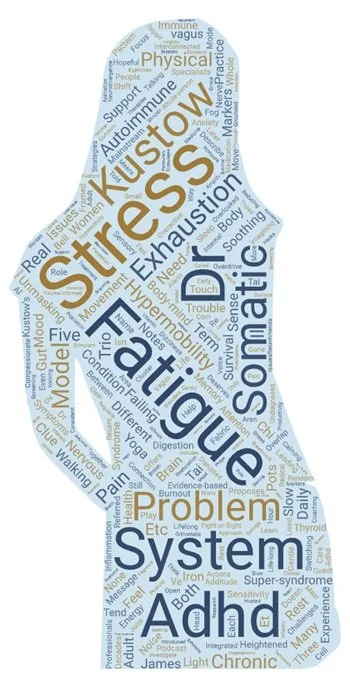ADHD and the Body: Understanding the Somatic Super-Syndrome
Many adults with ADHD describe a lifelong sense that something’s off - not just with focus or memory, but with their energy, digestion, pain levels, and even their immune system. And yet, they’re often told by professionals: “That’s just stress” or “That’s separate from your ADHD.”
But what if if isn’t?
British psychiatrist Dr. James Kustow, a leading voice in adult ADHD, offers a different way of looking at these challenges. In a recent ADDitude webinar and podcast episode, he introduced a model called the Somatic Super-Syndrome, a term to describe the overlap between neurodivergence and physical health issues that’s often overlooked in mainstream care.
A Triad of Trouble - But Also a Clue
Dr. Kustow's 3-S model proposes that many people with ADHD (especially women) experience chronic problems across three interconnected systems:
Stress system: Overactive fight-or-flight, leading to anxiety, burnout and disrupted sleep.
Sensory system: Heightened sensitivity to light, noise, fabric, touch, etc.
Somatic system: Real physical symptoms like chronic fatigue, dizziness, pain, gut issues, or thyroid problems.
These aren’t random. They tend to cluster together, especially in those who’ve gone undiagnosed for decades. Kustow’s message is clear: you are not imagining it - this pattern is real, and it deserves proper attention.
“If you’ve been referred to five different specialists for five different symptoms, but none of them are talking to each other- that’s the system failing you, not your body failing you.”
- Dr. James Kustow, ADDitude Podcast #545
What Can You Do About It?
Kustow doesn’t just name the problem—he offers hopeful, practical strategies.
1. ADHD Treatment May Support the Whole System
While ADHD medication is often framed as “just for focus,” Dr. Kustow notes that calming brain hyperactivity can also regulate the nervous system - reducing stress, fatigue, and even pain perception. For some people, it’s like switching off a life-long internal alarm bell.
2. Daily Nervous System Soothing
Chronic overdrive needs daily repair. Kustow recommends:
Breathwork and vagus nerve exercises
Gentle movement (yoga, tai chi, slow walking)
Somatic therapies or trauma-informed coaching
Small, consistent actions help shift the body out of survival mode and into restoration.
3. Investigate Physical Conditions That Amplify ADHD
He encourages thorough screening for:
Thyroid disorders
Iron, B12, and vitamin D deficiency
POTS (Postural Orthostatic Tachycardia Syndrome)
Mast cell activation or autoimmune issues
Joint hypermobility
These are common in the ADHD population and can worsen brain fog, exhaustion, and mood swings. He particularly notes how inflammation markers like IL-6 may play a role in both fatigue and attention problems (Quadt et al., 2024).
A Whole-Person Approach for a Whole-Person Condition
Dr. Kustow’s message is gently radical: ADHD isn’t just a brain condition, and support shouldn’t be limited to productivity hacks or stimulant prescriptions. Many adults - especially women diagnosed later in life - need an integrated, compassionate model that honours their lived experience.
This includes not just what we think, but how we feel, move, and rest. And it means seeking out professionals who are open to both evidence-based medicine and nervous system care.
While Dr. Kustow’s model is grounded in clinical observation and supported by early research, this area is still in its infancy - we’re only just beginning to understand how ADHD, inflammation, and the body’s physical systems truly interact.
📖 Curious to learn more?
• Watch the on‑demand recording “Unmasking the Somatic Super‑Syndrome” hosted by The Grove Practice - an insightful hour with Dr Kustow.

